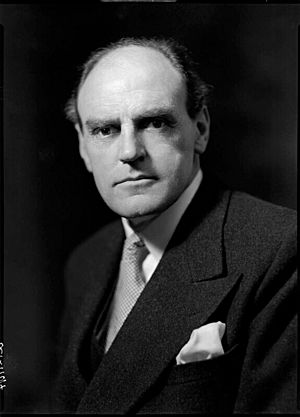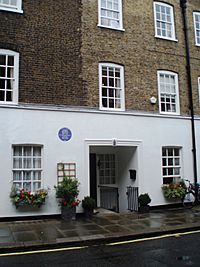John Reith, 1st Baron Reith facts for kids
Quick facts for kids
The Lord Reith
|
|
|---|---|

Reith in 1934
|
|
| 1st Director-General of the BBC | |
| In office 1 January 1927 – 30 June 1938 |
|
| Monarch | George V Edward VIII George VI |
| Preceded by | Position established |
| Succeeded by | Frederick Ogilvie |
| Minister of Information | |
| In office 5 January 1940 – 12 May 1940 |
|
| Prime Minister | Neville Chamberlain |
| Preceded by | Hugh Macmillan |
| Succeeded by | Duff Cooper |
| Personal details | |
| Born |
John Charles Walsham Reith
20 July 1889 Stonehaven, Kincardineshire, Scotland |
| Died | 16 June 1971 (aged 81) Edinburgh, Scotland |
| Resting place | Rothiemurchus chapel, Inverness-shire, Scotland |
| Spouse |
Muriel Reith
(m. 1921) |
| Children | 2, including Marista |
| Occupation |
|
John Charles Walsham Reith, 1st Baron Reith (20 July 1889 – 16 June 1971) was a very important British leader in broadcasting. He is famous for setting up the idea of independent public service broadcasting in the United Kingdom. This means that TV and radio should serve the public, not just make money.
In 1922, he started working for the British Broadcasting Company, which later became the British Broadcasting Corporation in 1927. He became its first Director-General. Reith believed that broadcasting should inform, educate, and entertain people. This idea shaped the BBC and many other broadcasting companies around the world. He was also an engineer and a very tall man, standing at 6 feet 6 inches (1.98 meters).
Contents
Early Life and War Service
John Reith was born in Stonehaven, Scotland. He was the youngest of seven children. His father was a Scottish Presbyterian minister, and Reith carried strong religious beliefs throughout his life.
He studied engineering at the Royal Technical College in Glasgow. After his studies, he worked as an engineer. In 1911, he joined the Territorials, a part-time army force.
When World War I started, Reith joined the Royal Engineers. In 1915, he was badly wounded in France by a sniper's bullet. It went through his left cheek and left a scar. After recovering, he worked in the United States, supervising arms contracts. He was promoted to captain and then major during the war.
After the war, Reith returned to engineering. In 1922, he worked as a secretary for a political group in London. This was when radio broadcasting was just starting.
Leading the British Broadcasting Company
Reith had no experience in radio when he applied for a job at the new British Broadcasting Company in 1922. He believed he could manage any company. He got the job as general manager.
He faced many new challenges, like dealing with music rights and patents. He had to figure out how to run a brand new type of company.
The General Strike and Impartiality
In 1926, a big strike happened in the UK called the General Strike. The BBC reported on it, trying to show all sides of the story. Reith wanted the BBC to be fair and independent.
The government, led by Prime Minister Stanley Baldwin, wanted to control what the BBC broadcast. They didn't want the opposition Labour Party to speak on the radio. Reith tried to allow them to broadcast, but the government said no.
Reith believed the BBC should be trusted to be fair, even during difficult times. He explained that the BBC had to work under government rules during the emergency. Many people now see his actions during the strike as key to the BBC's reputation for being impartial (fair and unbiased).
Becoming the British Broadcasting Corporation
The British Broadcasting Company was first owned by several wireless companies. However, Reith believed it should be owned by the public. He thought this would make it more independent.
In 1927, the BBC became a public corporation. Reith was knighted (given the title 'Sir') that same year. He became its first Director-General.
Reith was known for his strong leadership. He believed in a "benevolent dictator" style, meaning he was in charge but aimed to do good. The term "Reithian" is still used today to describe this style of management, especially in broadcasting.
He famously said the BBC's goal was to "inform, educate, entertain." This idea is still a core part of the BBC's mission. It has also been adopted by other public broadcasters worldwide, like PBS in the United States.
Under Reith, the BBC had strict rules. For example, on Sundays, they only broadcast religious services and classical music until the afternoon. This was to encourage people to go to church.
The King's Abdication
In 1936, Reith personally oversaw the broadcast when Edward VIII gave up his throne. Reith introduced the former king on air. This was a very important moment in British history.
Leaving the BBC
By 1938, Reith felt he didn't have enough to do at the BBC. He was invited to become the chairman of Imperial Airways, a major airline. He left the BBC, feeling sad but also ready for a new challenge.
His leadership made the BBC a world-class broadcasting organization. He shaped it with his strong beliefs and vision.
World War II and Government Roles
In 1940, during World War II, Reith became the Minister of Information in the government. He also became a Member of Parliament (MP).
Later, he held other government roles, including Minister of Transport and First Commissioner of Works. He was also made a Lord, becoming Baron Reith, which moved him to the House of Lords.
During the war, many British cities were bombed. Reith encouraged local leaders to plan how to rebuild their cities after the war. He left his government posts in 1942.
After the War
After the war, Reith held several important positions. From 1946 to 1950, he chaired the Commonwealth Telecommunications Board. He also led the Colonial Development Corporation until 1959.
In 1948, the BBC started the "Reith Lectures" in his honor. These are annual radio talks that discuss important topics and ideas.
When commercial television was introduced in the UK in 1954, ending the BBC's monopoly, Lord Reith was not happy. He believed that broadcasting should focus on moral and educational values, not just making money from advertising.
Later Life and Legacy
In 1960, Reith gave a famous interview where he spoke about his life. He said he often felt he hadn't been "fully stretched" and wished he had done more. He also admitted that he rarely watched television or listened to the radio after leaving the BBC.
In his later years, he served on the boards of several companies. He was also the Lord Rector of Glasgow University from 1965 to 1968.
John Reith died in Edinburgh in 1971 at the age of 81. His ashes were buried in a chapel in Scotland.
Controversial Views
It is important to know that in the 1930s, Reith held some views that are now considered very controversial and wrong. His diaries, published after his death, showed that he admired the strong leadership of figures like Adolf Hitler and Benito Mussolini, who were dictators. He wrote that he admired their "efficiency" and how they "cleaned things up." These views are widely condemned today.
Biographical Works
Reith wrote two books about his own life: Into The Wind (1956) and Wearing Spurs (1966). Other books and collections of his diaries have also been published, giving more insight into his life and thoughts.
Honours
- Knight Bachelor (1927)
- Knight Grand Cross of the Order of the British Empire (1934)
- Knight Grand Cross of the Royal Victorian Order (1939)
- Member of His Majesty's Most Honourable Privy Council (1940)
- Baron Reith (1940)
- Companion of the Order of the Bath (1945)
- Efficiency Decoration (1947)
- Knight of the Order of the Thistle (1969)
Personal Life
John Reith married Muriel in 1921. They were married until his death in 1971. They had two children, Christopher and Marista.
See also
- List of United Kingdom MPs with the shortest service
 | John T. Biggers |
 | Thomas Blackshear |
 | Mark Bradford |
 | Beverly Buchanan |


